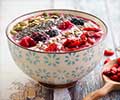Coffee Effects on Pregnancy, Breastfeeding, Abortion
Drinking coffee during pregnancy is fine if you consume a cup or two of coffee a day. However avoiding it or switching to decaf coffee is better for the baby developing inside you. Coffee has also been implicated in stillbirth and abortion.
Coffee and pregnancy is a hot topic for scientific research. Most research studies show conflicting results with respect to safety and intake of caffeine during pregnancy. Whereas some researches show that it is better to abstain from coffee or any caffeine product during pregnancy and breast feeding, other studies show that 2-3 cups of coffee per day won’t harm the baby growing inside you.
Those who support low to moderate intake of coffee are not decided about how much caffeine is safe.
The UK Food Standards Agency (FSA) has suggested an upper limit of 200 mg of caffeine per day for pregnant women whereas the American Dietetic Association (ADA) recommends up to 300 mg of caffeine per day to be the safe limit for expecting mothers.
Similarly, studies show contrasting evidence for effects of caffeine on delayed conception, miscarriage, birth defects and breast feeding.
Some of the studies are summarized here.
Coffee and stillbirth: A Danish study concluded that women who drank 8 or more cups of coffee during pregnancy were three times more likely to give birth to stillborn baby as compared to those who didn’t drink coffee. Another study found that women consuming 4 or more cups of coffee per day during pregnancy faced a higher risk of stillbirth. Still others found no association between stillbirth and caffeine consumption.
Coffee and abortion: A University of Pittsburgh School of Medicine study found that drinking coffee during pregnancy increased the risk of utero-growth restriction and spontaneous abortion. Another study revealed that there was a weak but significant association between coffee consumption and spontaneous abortion. Eleven percent of the spontaneous abortions could be attributed to smoking, 5 percent to alcohol, and 2 percent to coffee. Again, some studies did not find any significant associations between caffeine intake and risk of spontaneous abortion.
Caffeine and delayed abortion: A study published in the American Journal of Epidemiology suggested that intake of caffeine from coffee, tea, and caffeinated soft drinks were associated with an increased risk of delay in conception for upto one year or more. Drinking more than 3 cups of coffee per day was associated with highest risk of delayed conception. However, many researches found no connection between caffeine consumption and risk of delayed conception.
Coffee and breastfeeding: A Swedish study indicated that socio-economic factors and lifestyle choices such as smoking could affect breastfeeding, but coffee consumption was not associated with duration of exclusive breastfeeding. A review of research studies and a report by Nursing "Mothers" Breastfeeding Counsellors (Australia), however, point out that caffeine does enter breast milk to some extent and can have detrimental effect on production, volume, composition and ejection of breast milk besides having adverse effect on the infant. Breastfeeding mothers are encouraged to restrict their intake of caffeine to about a cup or so of tea or coffee.
Pregnancy and breast feeding can be a particularly stressful period for a woman. A cup or two of coffee can lift your mood and refresh you. But too much of caffeine will do you or your baby no good. If you can’t do without coffee, try switching over to decaf ones or caffeine-free drinks, but gradually, so as to minimize withdrawal symptoms.


















